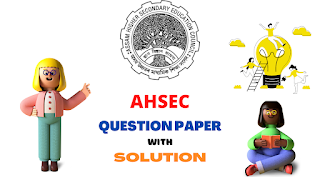AHSEC| CLASS 11| EDUCATION| SOLVED PAPER - 2024| H.S.1ST YEAR
2024
EDUCATION
Full Marks: 100
Pass Marks: 30
Time: 3 hours
The figures in the margin indicate
full marks for the questions
1. Give short answer as directed (any twelve) 1x12=12
Fill in the
blanks:
(a) The Latin
word ‘Duco’ means to lead, guide, or draw.
(b) John Dewey
considered education as a ‘tri-polar’ process and these three poles are
student, teacher and society.
(c) The chief
advocator of individual aim of education was Rousseau.
(d)
Hero-worshipping is the characteristic of Gang
Age period.
(e) Animism
is an important characteristic of Savage
period.
(f) Computer
was first invented by Charles Babbage
between 1791 to 1871.
(g) The
English word ‘psychology’ is derived from Greek
language.
(h) The
English word ‘emotion’ is derived from the Latin word emovere.
(i) “Education
is the natural, harmonious and progressive development of man’s innate powers.”
Who said this statement?
Ans:- Pestalozzi.
(j) “Destiny
of the nation is being shaped in her classroom.” Which Education Commission
remarked this statement?
Ans:- Kothari Education Commission.
(k) What is
the full form of CD-ROM?
Ans:- Compact Disc-Read Only Memory.
(l) In which
year was the University Grants Commission established?
Ans:- In 1956.
(m) Write the
full form of NCERT.
Ans:- National
Council of Educational Research and Training.
(n) Who first
developed the sociometric method?
Ans:- J.L. Moreno.
(o) What is
illusion?
Ans:- An
illusion is a false perception of reality.
2. Answer any twelve of the following questions: 2x12=24
(a) What do
you mean by formal education?
Ans:-
Formal education refers to a structured and systematic process of learning that
takes place in institutions such as schools, colleges and universities. It
follows a prescribed curriculum and is usually conducted by trained teachers.
Formal education is compulsory and has a fixed duration, with specific goals
and outcomes.
(b)
“Education is a life-long process.” Explain.
Ans:-
Education as a lifelong process means that learning continues throughout life
from birth to death. It includes all experiences that affect human personality,
including both formal and informal education. This process helps individuals
adapt to changing environments and constantly develop new skills.
(c) What is
infancy?
Ans:-
Infancy refers to the earliest stage of human development, usually lasting from
birth to about two years of age. During this period, infants undergo rapid
physical, cognitive and emotional development, becoming heavily dependent on
caregivers for support and development.
(d) Write two
differences between growth and development.
Ans:- Two
differences between growth and development:-
Growth refers to
an increase in size or quantity, often measured quantitatively. It is a
physical or biological process.
Development
involves qualitative changes, such as improvements in skills, abilities or
functions. It involves both physical and psychological aspects.
(e) Write two
important conditions of a science laboratory established in school.
Ans:- Two
important conditions of a science laboratory set up in a school:-
(i) Safety
equipment: The science laboratory should have adequate safety equipment
such as goggles, gloves and fire extinguishers to prevent accidents.
(ii) Proper
ventilation: Good ventilation is essential to remove harmful fumes and
ensure a safe working environment.
(f) Write two
characteristics of computer.
Ans:- Two
characteristics of a computer:-
(i)
Processing speed: Computers can process information quickly and accurately.
(ii)
Storage capacity: Computers have large storage capacities, allowing them to
hold large amounts of data.
(g) What is
experience curriculum?
Ans:- An
experiential curriculum focuses on learning through direct experiences and
practical activities. It emphasizes practical application and real-world
experiences to enhance understanding and retention.
(h) Write two
functions of District Institute of Education and Training (DIET).
Ans:- Two
functions of District Institute of Education and Training (DIET):-
(i) Teacher
training: DIET provides training to teachers to enhance their teaching
skills and knowledge.
(ii)
Curriculum development: DIET helps develop and implement educational
curriculum at the district level.
(i) What is
educational psychology?
EDUCATION SOLVED PAPERS PAGE LINK - Click here
BUY E-BOOK (PDF FILE)
[TO SEE FULL SOLUTION]
(Chapter wise Notes, Exam Question Papers solved, MCQ solved) [ARTS, COMMERCE, SCIENCE]
|
DOWNLOAD [PAGE LINK:-CLICK HERE] |
AHSEC PAGE LINK - CLICK HERE
Also Read:

